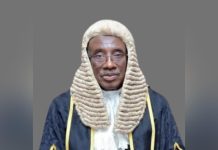Africa-Press – Gambia. Dear editor, All three arms of government, the Executive, the Judiciary and the Legislature need to take cognisance of the clear desire of the people of The Gambia for an anti-graft bill. All three branches must change the way they do things. The trio must take a candid look at itself and consider changing the way they conduct its business, if needs be. Because the fourth arm of government is watching and ready to blow the trumpet at any time.
Why is it that in the Gambia, the topic of judicial corruption is one that several judges, lawyers and jurists consider controversial and shy away from discussing? It appears that the issue has not been tackled by as many authors and institutions the same way that say, corruption in the executive wing of government, has been handled.
However, it is already an open secret that the Traffic Police of the Gambia Police Force, political parties, the Judiciary and the drivers, are the most perceived corrupt institutions in The Gambia by citizens.
The topmost institutions, where citizens have had actual experiences of bribery in order of descent, were the customs division of Gambia Revenue Authority (GRA), Passport Office and the Police Force.
Although majority of Gambians identify only bribery, embezzlement and fraud as forms of corruption, they are split on whether nepotism, conflict of interest, abuse of discretion and payment of facilitation fees as forms of corruption. The reasons why people pay bribes are to speed up work and to avoid problems with authorities.
Therefore, it behooves on the government to provide adequate financial resources to the for Human Rights Commission and the National Commission on Civic Education (NCCE) to work in collaboration with Civil Society Organisations (CSOs) and heighten the level of public education and sensitisation on the types of corruption, its impact and ways for citizens to engage in denouncing the canker.
Given the positive correlation between higher levels of education and recognition of different types of wrongdoing as corruption, the Ministry of Basic and Secondary Education (MoBSE) must systematically incorporate anticorruption education, as well as ethical norms and standards that influence perceptions of wrongdoing in the curriculum at all levels of education.
The reason for the under-development of the country is corruption which increases the poverty level of majority of Gambians, while resulting in non-availability of funds for the provision of basic amenities for citizens.
Mamsait Ceesay
Banjul
For More News And Analysis About Gambia Follow Africa-Press






